Superintendent Richard Henry Pratt writes to Doctor Cornelius Rea Agnew informing him that the school had gained new students, raising enrollment higher than it had been before. He also mentions the need for more money to improve school buildings. This letter is part of a series of related correspondence which can be found using the…
1880-1889
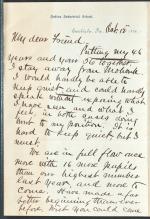
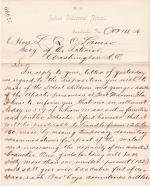
Richard Henry Pratt responds to a letter from Secretary of the Interior Lucius Q. C. Lamar regarding sending children and young adults at Fort Marion, St. Augustine, Florida to the Carlisle Indian School. Pratt provides details on the number of students that can be accommodated at Carlisle through temporary shelters and through sending students…
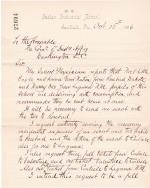
Request by Richard Henry Pratt for permission to send Noah Little Eagle (here Noel Little Eagle), Laura Good Nation, and Wamy Oso to their homes due to consumption.
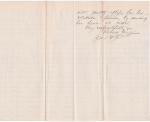
Robert Muggins requests the return of his sister, Laura Good Nation, from the Carlisle Indian School due to her poor health resulting from consumption. Muggins states that his people often die from consumption while remaining relatively well until the end. For that reason he requests her return as soon as possible.

Richard Henry Pratt refers to earlier letter and asks if he can send a favorable reply to Bishop Huntington's agent for enrolling Onondaga children at the Carlisle Indian School.
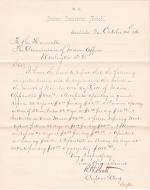
Captain Richard H. Pratt provides the Commissioner of Indian Affairs with a list of irregular labor required for November 1886. Pratt also includes details on compensation, position title, and the number of workdays required for the month.
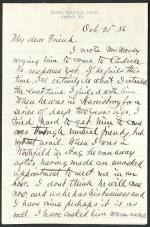
Superintendent Richard Henry Pratt writes to Doctor Cornelius Rea Agnew regarding attempts to get a Mr. Moody to visit Carlisle. Pratt also mentions that 75 or more Florida Apache prisoner children are expected to arrive at the school soon, and that the school was recently inspected by a Mrs. Clarke of Virginia. This letter is part…
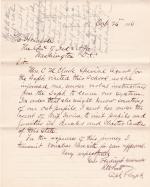
Submission of voucher for expenses by Richard Henry Pratt related to visit from C. M. Clark, Special Agent for the Department, who was instructed to learn the Carlisle Indian School outing system.
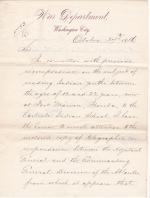
Secretary of War William Endicott informs the Office of Indian Affairs of orders issued to send individuals between the ages of 12 and 22 at Fort Marion to the Carlisle Indian School.
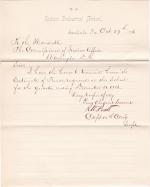
Estimate of funds for the fourth quarter of 1886 amounting to $11,389.32 for support of the school. Richard H. Pratt also requests additional funds amounting to $6,667.50 for regular employee pay.
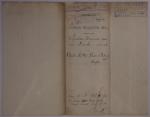
Richard H. Pratt submits an Estimate of Supplies for the fourth quarter of fiscal year 1886 amounting to $494.55 and requests to purchase those items in the open market. The form includes the items being requested, the quantity, the estimated cost, and how the item will be used at the school.
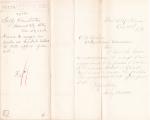
Sally Hambleton acknowledges receipt of an appointment as a teacher at the Carlisle Indian School and informs the Office of Indian Affairs that she is resigning the position.

These materials include a cover letter and Descriptive Statement of Pupils regarding 37 Chiricahua Apache prisoners-of-war transferred to the Carlisle Indian School from Fort Marion in St. Augustine, Florida, where a larger group of Geronimo's band remained imprisoned. The 37 individuals transferred to Carlisle represented a portion of all…
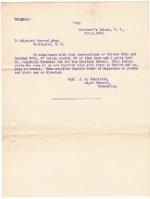
J. M. Schofield informs the Adjutant General of the Army that 37 Apache students have departed from Fort Marion for the Carlisle Indian School including 29 boys and 8 girls. Further writes that 4 girls who were set to leave stayed due to fever.

Captain Richard H. Pratt submits a report that lists irregular employees and includes details on their compensation, position titles, race, and the number of days worked at the school in October 1886. Pratt distinguishes between the employees, whose names appear on the first page, and the "Indian Apprentices" listed on the subsequent pages of…
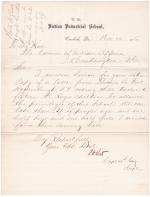
Richard Henry Pratt forwards a letter to the Office of Indian Affairs from Thomas La Fort regarding enrolling students at the Carlisle Indian School from the St. Regis reservation.
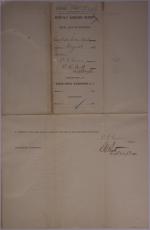
O. G. Given, the school physician, compiles the monthly sanitary reports for August, September, and October 1886. Given also includes a short note about a case in the "Remarks and Physician's Special Report" section of the September report.
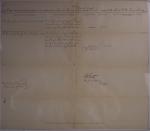
Richard Henry Pratt submits a "Special" Estimate of Funds form for $555.00 to purchase "Paragon" school seating at .85 cents per feet and transportation of supplies.
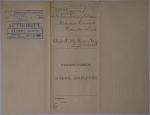
Captain Richard Henry Pratt submits a report that lists new employee (C. H. Hepburn) as well as one who changed positions (James H. Richards). The reports include position title, salary, date of departure, and reason for departure. An explanatory cover letter is included in which Pratt requests to hire an outing agent and to relieve a…
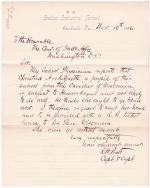
Richard Henry Pratt seeks authority to cover the expense to return Christine Archiquette to her home due to hemorrhages.
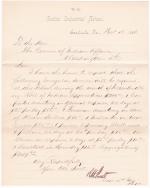
Captain Richard H. Pratt provides the Commissioner of Indian Affairs with a list of irregular labor required for December 1886. Pratt also includes details on compensation, position title, and the number of workdays required for the month.
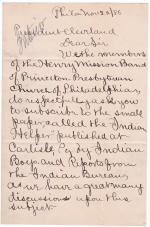
George S. Holloway of the Henry Mission Band of the Princeton Presbyterian Church of Philadelphia writes to President Grover Cleveland asking him to subscribe to the Indian Helper published at the Carlisle Indian School.
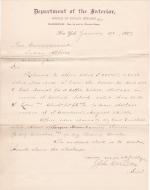
John R. Wilbon, Superintendent of the Office of Indian Affairs Warehouse in New York, forwards a receipt covering shortage of three coffee boilers for the Carlisle Indian School.
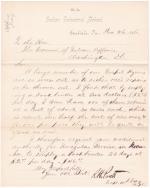
Richard Henry Pratt requests authority to employ a bookbinder to repair 150 worn out gospel hymnals.
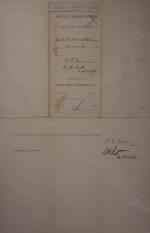
O. G. Given, the school physician, compiles the monthly sanitary report for November 1886. Given also includes a note about the cases in the "Remarks and Physician's Special Report" section.
